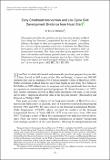Early Childhood Intervention and Life-Cycle Skill Development: Evidence from Head Start

View/
Author
Published Version
https://doi.org/10.1257/app.1.3.111Metadata
Show full item recordCitation
Deming, David. 2009. “Early Childhood Intervention and Life-Cycle Skill Development: Evidence from Head Start.” American Economic Journal: Applied Economics 1(3): 111–134. doi:10.1257/app.1.3.111. http://dx.doi.org/10.1257/app.1.3.111.Abstract
This paper provides new evidence on the long-term benefits of Head Start using the National Longitudinal Survey of Youth. I compare siblings who differ in their participation in the program, controlling for a variety of pre-treatment covariates. I estimate that Head Start participants gain 0.23 standard deviations on a summary index of young adult outcomes. This closes one-third of the gap between children with median and bottom quartile family income, and is about 80 percent as large as model programs such as Perry Preschool. The long-term impact for disadvantaged children is large despite "fadeout" of test score gains.Terms of Use
This article is made available under the terms and conditions applicable to Open Access Policy Articles, as set forth at http://nrs.harvard.edu/urn-3:HUL.InstRepos:dash.current.terms-of-use#OAPCitable link to this page
http://nrs.harvard.edu/urn-3:HUL.InstRepos:12305831
Collections
- GSE Scholarly Articles [366]
Contact administrator regarding this item (to report mistakes or request changes)


